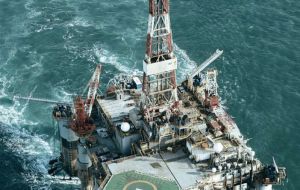MercoPress. South Atlantic News Agency
Falkland Islands as oil-producing country: boon or blight?
 Stephen Nicol of Regeneris forecast a short term population increase of 20%, not including temporary workers
Stephen Nicol of Regeneris forecast a short term population increase of 20%, not including temporary workers  With oil at 100 dollars a barrel in 2018, Falklands GDP, would leap from £140 million to just over £1 billion
With oil at 100 dollars a barrel in 2018, Falklands GDP, would leap from £140 million to just over £1 billion For some, the prospect of the Falkland Islands becoming an oil-producing country creates exciting visions of opportunity, while for others it seems like a nightmare. What is certain is that oil, like sheep and fishing before it, will inevitably bring changes to both our wealth and our way of life.
In order to get a better idea as to whether these changes will be beneficial, harmful or a mixture of the two, a sizeable group of interested citizens met in the Community School last week to listen to a presentation by Stephen Nicol of the economics research analysts, Regeneris.
The likely impact of oil development is a big subject provoking many questions, to which some possible answers had already been provided by the socioeconomic survey commissioned from Plexus on behalf of Rockhopper Exploration PLC. However that study, which might reasonably have been expected to be partisan if not biased, dealt only with the predicted impacts of the involvement, of Rockhopper and their majority partner in the development of the Sea Lion field, Premier Oil.
Regeneris had been commissioned by the Falkland Islands Government (FIG) to take a longer and wider view. As Mr Nicol explained, his company’s brief was to understand the potential economic and social impacts on the Falklands arising from the Sea Lion development, but also to consider the impact of other scenarios involving additional exploration and development. The reason for this was to help FIG better prepare its response and strategies with a view to optimising positive impacts and minimising negative impacts.
To this end, since being commissioned by FIG, Regeneris had looked at what had happened in other parts of the world as well as holding detailed discussions with oil and gas companies with interests in the Falklands and reviewing a wide range of documentation from a variety of sources including the 2012 census. During a series of public consultation exercises arranged as part of two field work visits to the Falklands, they had involved over a hundred people in meetings and focus groups.
Mr Nichol presented four possible scenarios as a basis for illustration. Scenario 1 on which most of his speech was predicated was essentially representative of the present position in which two more exploration rigs may be expected in 2014 and 2015, with Premier oil beginning a process, hopefully leading to the extraction of the first oil from the Sea Lion Field in 2017.
The other scenarios, which envisaged more successful oil exploration leading to the development of two new fields around 2021 (Scenario 2), plus the exploitation of gas reserves, either off-shore (Scenario 3) or offshore (Scenario 4) were inevitably more speculative.
In his introduction, Mr Nicol said that he and his team had been on the whole surprised at the degree of public support for oil development that they had discovered in the Falklands. There would be considerable changes even as a result of the most modest scenario but most were similar to those predicted in the Plexus study.
One difference was that the number of jobs created, which might be expected to peak at around 350-400 in the years 2016 to 2017 would, at around 175 when the development phase entered what could be regarded as ‘a steady state’ be higher than that predicted by Plexus.
Effects on permanent population were rather harder to predict, given that most of the labour requirement would be off-shore and often of a temporary nature, but a peak of 190 housing units might be required. This should settle down to around 100 in the longer term, not counting a further requirement for accommodation for temporary workers and those in transit.
Assuming no further oil developments than those envisaged in Scenario One, there would be a considerably increased demand for construction skills during the period of infrastructure provision, but this would settle down from 2020 onwards to a requirement for about 175 jobs, divided more or less equally between onshore oil and gas activities, supply chain activities, public sector increases and increased activity in the private sector.
Among the necessary activities which will be required for ‘first oil’ production in 2017 and will lead to a short-term increased labour demand, are the construction of a temporary harbour with the work beginning in 2014 and the harbour entering into operation in 2016.
Regeneris forecast a short term population increase of 20%, not including temporary workers, which should peak in 2016 and 2017 before reducing to a ‘steady state’ figure of around 10% (230) thereafter.
While the preservation of the historic look and feel of Stanley had been expressed to Regeneris as one of the population’s main concerns, Mr Nicol seemed to be of the opinion that once an initial period of increased activity around FIPASS was over and the principal industrial area had been moved to the other side of Wireless Ridge with the opening of the new port, Stanley would easily absorb the required increases in population size. A larger population, coupled with much increased government revenues could also lead to the provision of a better level of services and facilities for all.
As is mentioned elsewhere, these quoted increases in economic activity relate solely to those derived directly from oil and do not include what could be the considerable impact of government investment elsewhere in the economy.
The Regeneris report does not predict major changes brought about in Camp due to the first scenario. On the positive side, an increased Stanley population will inevitably bring with it increased opportunities for the sale of agricultural products, primarily meat, while on the negative side Mr Nicol ventured that government might find itself having to find ways to counteract an increased ‘Stanley pull.’
An exception, if that is the option chosen and all agreements and planning processes have been completed, is the possible assembly of flow-lines on shore, somewhere in Camp. This would need to be completed by the end of 2016, during which year also a two-year program of drilling in the Sea Lion Field would begin to enable extraction to begin at the planned time in 2017.
To the surprise of some members of his audience, who later commented on it, Mr Nicol’s illustration of activity during his first scenario had work on the proposed new permanent port not beginning before an uncertainly predicted 2017, with a presumably equally uncertain predicted finishing date in 2019.
According to this scenario, if crude oil which is currently worth between $92 and $100 per barrel were to be worth $100 a barrel in 2018, the Falklands GDP, which is at present around £140 million would have leaped to just over £1 billion and would not return to current levels till around 2045.
On the other hand, should the oil price defy present predictions of increase and fall to $80 per barrel in 2018, Falklands GDP would increase to around £675 million, returning to current levels around 2039.
Currently FIG revenue from oil-related activity stands at around £40 million, but according to the Regeneris Scenario 1, this figure would leap to just over £150 million from royalties on the first two years of production. The onset of corporation tax revenues in 2020 should take FIG combined revenue from tax and royalties up to a stratospheric £400 million, given an oil price of £100 per barrel.
While decreases begin almost immediately after this peak, current levels of oil-related revenue are not resumed until 2048. FIG annual average estimated income over this thirty-year period is estimated at a healthy £150 million at £100 per barrel (£110 million at £80 pounds per barrel).
As Mr Nicol pointed out, these figures are based solely on the Scenario One level of oil-related activity and do not take into account any increased revenue to FIG which would be expected to flow from other economic activities that such vastly increased levels of income should make possible.
These figures may seem mind-boggling to readers old enough to remember the early pre-fishing licensing ‘eighties when FIG annual revenues, apart from aid, totalled about £4.5 million, however they are as nothing compared to the FIG income levels to be achieved and maintained should other oil fields be developed. (PN)




Top Comments
Disclaimer & comment rules-

-

-

Read all comments“hopefully leading to the extraction of the first oil from the Sea Lion Field in 2017”
May 03rd, 2013 - 03:57 am 02017 is now hopefully?
Meeting video
http://www.youtube.com/watch?v=O1CfI5uh02U
@1 Marcos
May 03rd, 2013 - 06:39 am 0Jealous much?
Nothing in the oi business is certain, anyone with half a brain knows that.
It just kills you to know that one day the Falklands Islands will become rich and prosperous, doesn't it?
Never mind you can continue to support Argentina a failing 'never was' country mired in its own 'fictional' past.
A country that has huge natural resources that should make it ne of the richest countries on the planet, but is run by a bunch of selfish gangsters who spend all their time in office stuffing their own bank accounts with US dollars, whilst diverting the gullible masses with the fictional past.
The problem is that one day the masses will stop being so gullible and will rise up and remove the gangsters.
It's going to happen, and argentina will eventually turn up on the FIG's doorstep 'cap in hand' asking forgivness, and if there's any chance of the FIG putting some buisness their way.
May 03rd, 2013 - 06:42 am 0Wait and see.
Commenting for this story is now closed.
If you have a Facebook account, become a fan and comment on our Facebook Page!